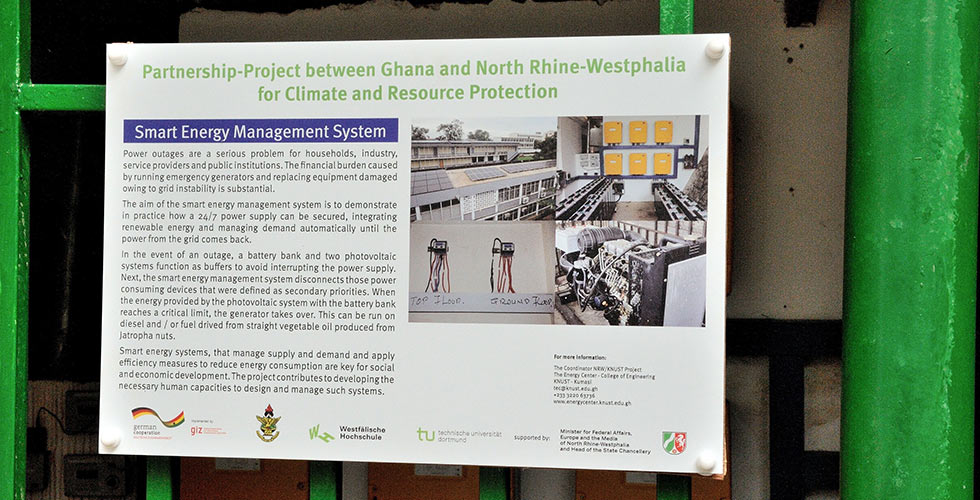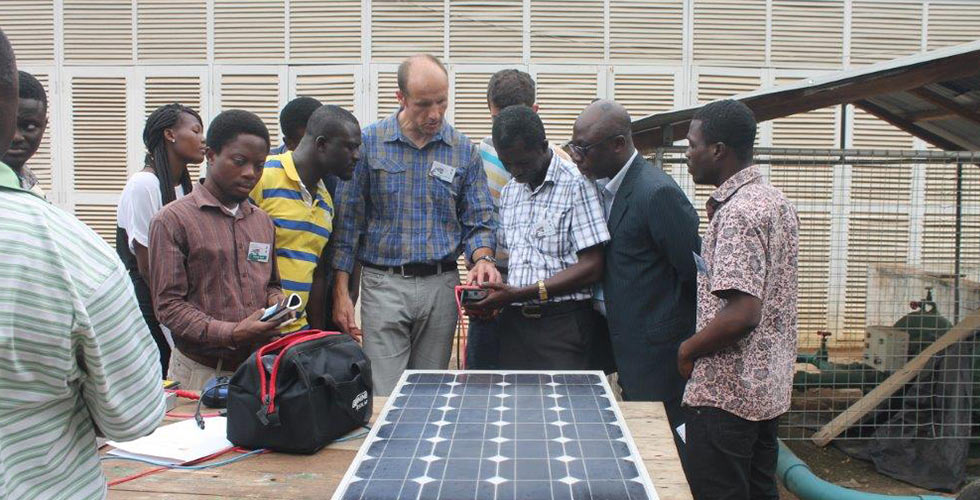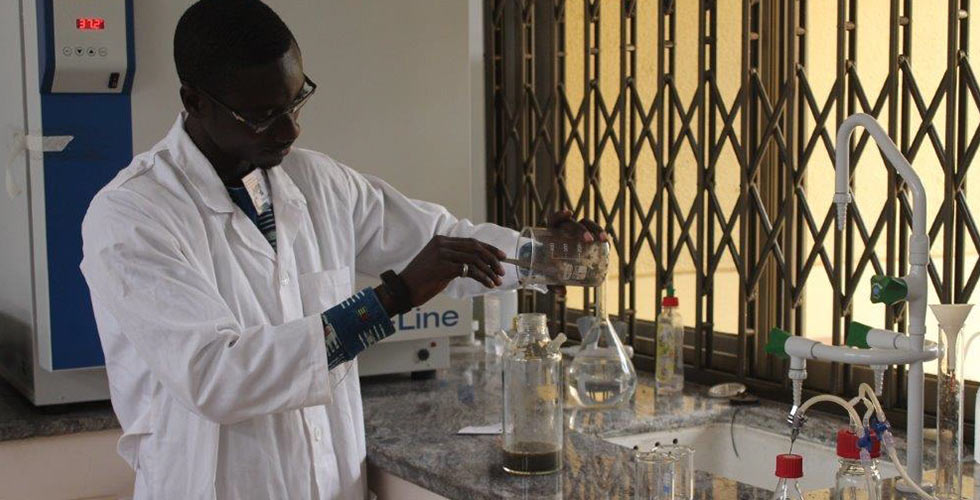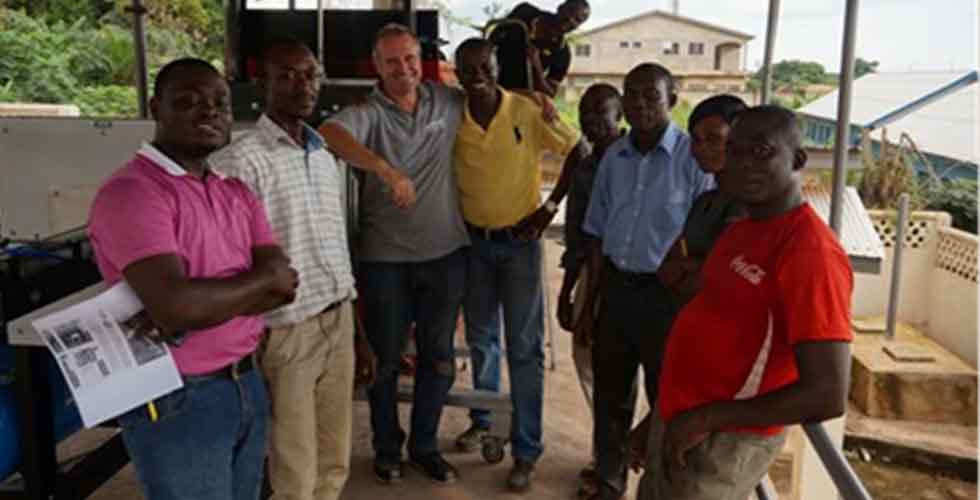BACKGROUND TO THE PROJECT
Sustainable economic development requires careful handling of natural resources, the climate and the environment. Ghana has some catching-up to do in this area. For instance, its energy supply industry has failed to keep pace with increasing consumption by its population of some 30 million. Frequent power cuts are slowing economic growth. Although the Ghanaian Government has approved a law promoting renewable energy in order to improve energy supply in the country and strengthen the fight against climate change, implementation of the law is faltering, not least because Ghana lacks the necessary expertise.
In the country’s waste management industry too, inadequate structures for waste disposal and a skills shortage are also preventing the sustainable management of a growing mountain of rubbish and new kinds of waste. There are no overarching strategies to link waste prevention, recycling and environmentally sustainable disposal, and prevent environmental pollution.
PROJECT OBJECTIVE
The project set out to strengthen expertise in renewable energy, energy efficiency, waste management and resource conservation at the Kwame Nkrumah University of Science and Technology (KNUST) in Kumasi. Competency in these areas was to be built up at the university through innovative pilot projects. The newly acquired knowledge should be integrated into applied teaching and research.
Another aim was to strengthen the technical capacity of other actors for climate and resource protection in Ghana, and thus to help build a corresponding national network of expertise.
PROJECT ACTIVITIES
The project centred around professional cooperation between KNUST, TU Dortmund University and the Westphalian University of Applied Sciences in Gelsenkirchen. This cooperation helped to develop expertise at KNUST. It also fostered the exchange of ideas among scientists and researchers, and the pooling of their experience and expertise in renewable energy, waste management and resource conservation.
The following activities were implemented:
A reliable power supply
A pilot plant for trialling an uninterruptible power supply was built at KNUST. The plant integrates energy from renewable sources and was designed and set up jointly by the university partners from Ghana and NRW. The pilot plant simulates a self-contained ‘village power supply’ that uses smart energy management and renewable energy sources to ensure a basic supply if there is a power cut. The plant is the only one of its kind in the region. It offers the teachers and students at KNUST the opportunity for applied teaching and research and the chance to develop new expertise.
Solar training centre
A small solar training centre was built on the KNUST campus, where training with a practical focus is offered on installing and using photovoltaics and solar thermal energy.
Passive cooling
A feasibility study was run to assess whether a pilot project could be launched to cool the KNUST auditorium using solar energy. Due to the high costs, however, the decision was taken to trial an alternative low-cost solution for cooling the building. Together with the company SICC Coating, a passive cooling project was therefore implemented for the auditorium, whereby coating it in a heat-reflecting paint served to reduce temperatures inside.
Harnessing biogas and biomass
A biogas and biomass laboratory was set up at KNUST, where its students and staff can analyse gases and study the calorific values of biomass. Staff at the KNUST laboratory were given relevant training at the Westphalian University of Applied Sciences in Gelsenkirchen, while a utilisation concept was also devised for the laboratory. The laboratory enables KNUST students to acquire expertise in the use of biomass and biogas in a highly practical setting.
In addition, a simple biogas plant was constructed on the KNUST campus for training purposes. It is available for the students to study.
Training
Various training courses were organised at KNUST under the partnership with the universities from NRW, in order to enhance its expertise in climate change mitigation and resource conservation. For instance, a summer school was held in Kumasi together with the Westphalian University of Applied Sciences and the Ruhr Master School of Applied Engineering, intended for students at the partner universities in Ghana and North Rhine-Westphalia. Topics such as biogas, biomass, energy efficiency and solar power were covered in parallel events. As well as talks, the summer school also offered practical workshops led jointly by the lecturers from the universities in Ghana and North Rhine-Westphalia. KNUST’s newly constructed pilot plants were used for the practical training sessions.
Multiplier training with a practical bent was run in cooperation with TU Dortmund University for the benefit of teachers at KNUST. This focused on using smart energy management to ensure an uninterruptible power supply. Incorporating the main pilot plant into the teaching at KNUST was a key element of the applied training course. Teaching concepts for training modules at KNUST were also developed to enable the applied teaching of climate change mitigation and resource conservation using the new pilot plants.
Green business models
A competition was launched to come up with ‘green’ business ideas. The ‘Green Entrepreneurship Award’ was designed to link entrepreneurial thinking with solutions to environmental problems. The contest was devised and organised under a partnership between Bonn-Rhein-Sieg University of Applied Sciences (HBRS), its partner university the University of Cape Coast (UCC), and KNUST. The third run of the competition was held at KNUST for the first time. Around 100 students from UCC and KNUST took part in each edition of the ideas contest. The winners received a cash prize to put towards further developing their business idea.
Safe waste disposal
The project also helped the city of Kumasi to dispose of its waste properly, focusing on waste disposal at the state-run Komfo Anokye Teaching Hospital (KATH). As the existing incinerator used by the country’s second-largest hospital was faulty and could no longer be repaired, infectious waste was ending up untreated on Kumasi’s landfill site – posing a risk, especially in view of the Ebola crisis in West Africa.
A new incineration plant for infectious clinical waste was thus constructed at KATH. At the same time, a plan was devised for disposing of clinical waste properly, and hospital staff were trained in handling this waste and operating the new plant. This allowed the risk of infection within the hospital and the spread of disease within Kumasi to be minimised, as well as drastically reducing the negative impact on the economy.
A study for setting up a collection point for reusable materials was also drawn up by a team of experts in order to provide further support to the city of Kumasi. To this end, the conditions on the ground were investigated and potential measures for creating the new collection point identified.
As part of a pilot scheme, a partnership was instigated with the Oforikrom – Dagomba Line Scrap Dealers Association (ODLSDA) in Kumasi, for whom a small-scale collection point and workshop were constructed. Since then, the informal scrap workers have been able to work in better and safer conditions. The pilot scheme also included developing an incentive model for properly disposing of and recycling fridges and freezers. This incentive scheme is required because it is more lucrative to sell the reusable materials inside these appliances than to pay to have them disposed of in an environmentally friendly way. Old faulty appliances are therefore being disposed of improperly, releasing ozone-depleting substances into the atmosphere. The pilot scheme revealed that a system of incentives for informal scrap work can put a stop to environmentally harmful practices.
WACEE environmental exhibition and conference
Alongside the technical measures, the West African Clean Energy Exhibition & Conference (WACEE), which is held each year in Accra, was also a key element of the project. A day-long industry conference is organised during the WACEE every year in order to discuss the issues of climate change mitigation and resource conservation with relevant representatives from Ghana, and thus help to mainstream the cooperation at a political level.
Environmental protection comes to school
In consultation with Kumasi’s mayor, the project visited 19 schools in the city to raise awareness of environmental protection. Students planted around 10,000 saplings. Thus amongst other things, the project added weight to the mayor’s campaign for more greenery in Kumasi, which is also known as the ‘Garden City’.
Fifteen schools set up environment clubs and 100 teachers took part in training so that they could cover the topic of environmental protection in detail in their lessons.
Touring exhibition
A touring exhibition entitled ‘Aluminium, gold, e-waste – Nothing shines without a shadow’ was created in partnership with Engagement Global, the One World Network NRW and Germanwatch. The exhibition highlights the links between consumer behaviour in Germany and the depletion of raw materials in countries such as Ghana. It shows how important raw materials are extracted in Ghana and what happens there to e-waste, some of which originated in Europe. The negative impact this is having on the people and environment in Ghana is also made clear. The exhibition has appeared in over 25 educational and cultural institutions in Germany since it was finalised in 2016. It can be loaned for development education work through the One World Network NRW.
Title: Climate and Resource Protection for Sustainable Economic Development in Ghana
Term: August 2013 – May 2018
Sector: Environment
Supported by: State Chancellery of North Rhine-Westphalia
- Kwame Nkrumah University of Science and Technology (KNUST), Kumasi
- TU Dortmund University
- Westphalian University of Applied Sciences in Gelsenkirchen
- Bonn-Rhein-Sieg University of Applied Sciences
- University of Cape Coast
- Kumasi Metropolitan Assembly
- Oforikrom – Dagomba Line Scrap Dealers Association (ODLSDA)
- Komfo Anokye Teaching Hospital (KATH)
- ETLog Health
- EnergyAgency.NRW
- Ministry of the Environment, Nature and Transport of the State of North Rhine-Westphalia (MUNV)















